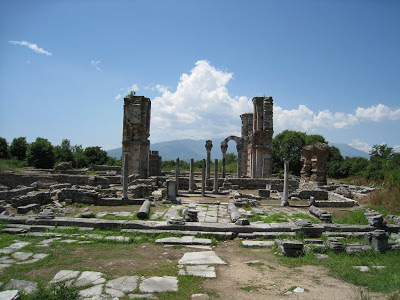While Philippi was an important city in the Roman and early Christian period, it remains an archaeological site today. The Via Egnatia, the important Roman road linking East and West, passes through this city. The remains of Philippi are impressive and it is certainly worth a visit. It will be one of the major highlights of our trip to Northern Greece.
According to Acts 16:12, Paul and his companions travelled from Neapolis to Philippi, a distance of 16km (10 miles), where they remained for some days.
The Greek NA28 text of Acts 16:2 describes Philippi as πρώτη[ς] μερίδος τῆς Μακεδονίας πόλις demonstrating the undertainty involved concerning the text. What kind of city was Philippi? A complex textual problem here has led to a conjecture about what the reading should be - and the problem is compounded by an alphabet in Greek, the sigma, in the word πρώτης.
So is Philippi a πρώτης μερίδος τῆς Μακεδονίας πόλις or πρώτη μερίδος τῆς Μακεδονίας πόλις? Is Philippi a city of that first district in Macedonia; or a leading city (or first city) of that district of Macedonia? This difficulty is acknowledged in the textual notes of most English translations. For example, NIV states, "The text and meaning of the Greek for the leading city of that district are uncertain".
To resolve this issue, several possible suggestions have been put forward.
- Some have suggested that the author means Philippi was the first Macedonian city Paul and his companions visited when they came into the district. But, in actual fact, this was not the case. The first city that Paul set foot on was Neapolis which is in the same district as Philippi.
- Some have also suggested the use of πρώτη as a title of honour, and this is something liken to an expression of civic pride. According to R. Ascough, "Civic Pride at Philippi: The Textual Problem of Acts 16.12," NTS 44 (1998): 93-103, civic pride often meant ascribing titles to a city in order to lift up its importance. If Ascough is correct, it appears that the author of Acts is attempting to magnify the importance of the status of Philippi in Macedonia, perhaps to underscore the fact that Philippi was the first European city to receive the gospel from Paul the missionary. Furthermore, Luke stresses that Philippi was a Roman colony, perhaps pointing forward to the charges levied against Paul and his team in Acts 16:20-21.
As a result of the difficulties in reading the text above, a number of scholars prefer to adopt the conjecture in reading πρώτη as πρώτης despite the lack of manuscript evidence. For example, F.F. Bruce in his revised commentary on Acts in the NICNT series defended this reading (see his argument in footnote 29, pages 308-309). This resulted in rendering the meaning of the phrase as "a city of the first district of Macedonia."
While there is no concrete solution to this textual difficulties, it is wise to take head of Metzger's proposal that "it appears ill-advised" to abandon the testimony of strong manuscript support for reading Philippi as πρώτη μερίδος τῆς Μακεδονίας πόλις, "a leading city of the district of Macedonia." The suggestion puts forward by Ascough should not be entirely discounted as well. As such, I am prepared to depart from the critical text in NA28 by adpoting the reading of πρώτη μερίδος τῆς Μακεδονίας πόλις. And this is line with most of the English translations.
For further information:
1) Bruce Meztger, A Textual Commentary on the Greek New Testament, 2nd ed. (Stuttgart, UBS, 1994), 393-395.
2) R. Ascough, "Civic Pride at Philippi: The Textual Problem of Acts 16.12," NTS 44 (1998): 93-103.

 RSS Feed
RSS Feed